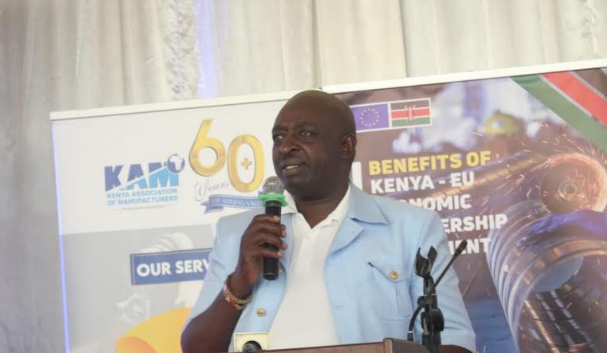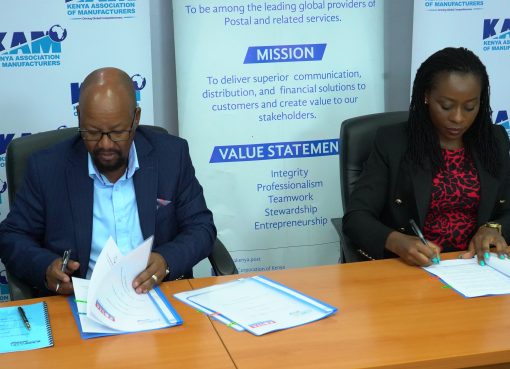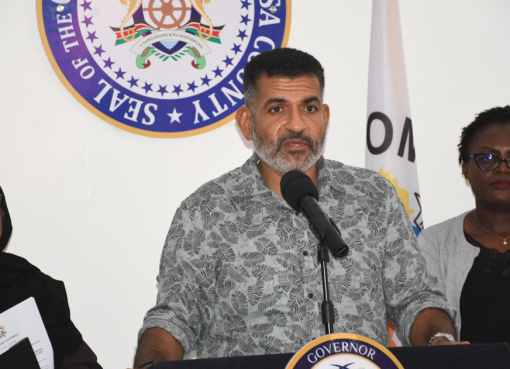Exporters and business people in Kenya have been asked to market the Kenya-European Union bilateral agreement so that they can understand and exploit it to the maximum.
Speaking during a sensitisation forum in Mombasa on the agreement, the National Assembly Committee on Trade, Industry, and Cooperatives led by the Chairperson James Gakuyu said that the agreement will lead to a significant strengthening of country trade and investment ties, contribute to the diversification of the country’s economic activities, foster competitiveness, and attract more investment.

Gakuyu, who is also the Embakasi North Member of Parliament, noted that the European Partnership Agreement (EPA) provides a platform to support job creation on both sides, along with targeted cooperation to enhance Kenya’s economic development.
“It is the most ambitious trade deal ever signed by the EU with a developing country when it comes to sustainability provisions such as climate and environmental protection, labour rights, and gender equality,” he said.
He added that EPA will boost trade in goods and create new economic opportunities, with targeted cooperation to enhance Kenya’s economic development.
“We are celebrating the economic partnership agreement between Kenya and the European Union (EU) as a committee. This particular economic agreement is very essential to us as a country, since it is a particular agreement between the country and the EU. Having this window where exports are quarter-free and duty-free is a plus to exporters. It is a win to both parties under the bilateral agreement,” said Gakuyu.
He noted that Kenya can benefit directly from this market, especially in the Coast region, where there are many products exported, including minerals.
He added that the region is on the frontlines to benefit from this particular product since there are many products available that can find their way into the European market.
He further noted that the agreement also takes care of the whole scope; thus, no county will be locked out of the market. Therefore, he called for people to get used to the situation since there are many bilateral agreements signed.
“We have the African Growth and Opportunity Act (AGOA), which is coming to an end next year, and we have not exploited it very well as a country since we were utilising this particular window for only 10 to 11 percent, majorly in three areas only, which are apparel, textiles, and minerals,” he said.
He noted that the government comes in to make sure it opens as many windows as possible to create parts of exports and also to provide ready markets for local products.
He added that the government has put in place agencies that are linkages, such as Kenya Exports Promotion and Branding Agency (KEPROBA), which has a well-stipulated mandate to make sure that they take charge of branding of products and market them.
He noted that there is also Kenya Investment Authority (KENINVEST), which is to attract investors, educate them on the benefits of this bilateral agreement, and also look for investors outside and give them the best working environment.
The chairman pointed out that there are also county aggregation centres, which is a milestone as the players in business will be able to directly source products from farmers that actually have aggregated their products to those particular centres, and farmers can get investors directly, who are chained by agencies.
He said as parliament they will urge the government to make sure that the agencies are well funded so that they can make a realisation of their dreams.
On his part, Robert Gichimu, Member of Parliament for Gichugu Constituency, said that they were able to sit with the trained department of the ministry of investment, trade, and industry and passed the report to parliament that bore fruit for the first sensitisation meeting to happen.
He urged Kenyans to take advantage of the sensitisation so that they can have an opportunity to export duty-free, quarter-free, and the country will grow economically.
“I will also urge the EU to create capacity-building forums so that Kenyans will know the standards required for exported goods,” he added.
First Counsellor Head of Trade Section Filippo Amato said Europe is the main export destination of Kenya, as in 2023 1.2 billion exports were exported; these include flowers, vegetables, and coffee, among other products.
Amato said the intention of the EPA is to improve and boost more exports, granting duty-free/quarter-free access to the European market for an unlimited period of time.
“This creates predictability and stability for investors, and we hope that the exports will increase even more. There will also be a gradual lowering of duties from Kenya, but this will be for a very long period of time, for the next 25 years,” he said.
He added that the local industry will be able to lower the cost of production since they are working on a lot of capacity programmes for exporters to meet our standards.
By Chari Suche





